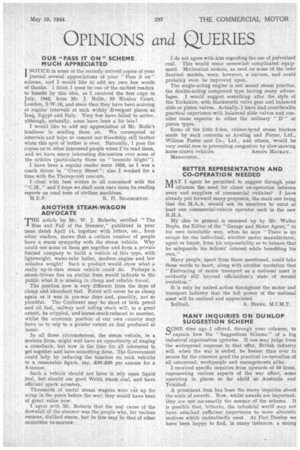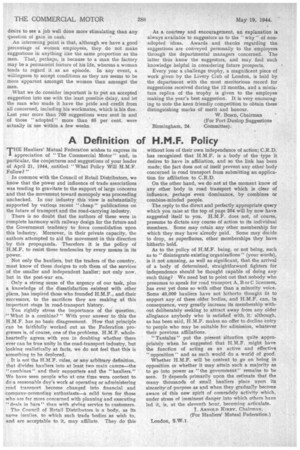OPINIONS and S UERIES
Page 33

Page 34

If you've noticed an error in this article please click here to report it so we can fix it.
OUR l'PASS IT ON" SCHEME MUCH APPRECIATED
I NOTICE in some of the recently arrived copies of your journal several appreciations of your "Pass it on" seheme, and I would like to add my own few words of thanks. I think I must be one of the earliest readers to benefit by this idea, as I received the first copy in July, 1942, from Mr. J. Rolfe, 53 Kimber Court, London, SAVA& and since then they have been arriving at regular intervals at such widely divergent places as 'Iraq, Egypt and Italy. Very few have failed to arrive, although, naturally, some have been a bit late !
I would like to add my appreciation of Mr. Rolfe's kindness in sending them on. We corresptind at intervals and hope to cement our friendship still further when this spot of bother is over. Naturally, I pass the copies on to other interested people when I've read them, and we have many interesting discussions over some of the articles (particularly those on "bromide blight").
I have been a regular reader since 1926, as I was a coach driver in "Ciliary Street"; also I worked for a time with the Thornycroft concern.
I close With best wishes to all concerned with the "C.M.," and I hope we shall soon once more be reading reports on road tests of civilian machines.
M.E.F. . E. H. SHAcKLETON
• ANOTHER STEAM-WAGON ADVOCATE
TE article by Mr. W. J. Roberts, entitled "The Rise and Fall of the Steamer," published in your issue dated April 14, together with letters, etc., from other readers, shows that a certain number of people have a warm sympathy with the steam vehicle. Why could not some of them get together and form a private limited company to build a vehicle of this type, with lightweight, water-tube boiler, modern engine and low unladen weight? Such a product would .show what a really up-to-date steam vehicle could do. Perhaps a steam-driven bus on similar lines would indicate to the public what it is missing in cheap and reliable travel.
The position now is very different from the days of cheap and abundant fuel. Petrol will never be so cheap again as it was in pre-war days and, possibly, not so plentiful. The Continent may be short of both petrol and oil fuel, railway and rolling stock will, to a great extent, be crippled, and horses much reduced in number, whilst the economic position of our own country may force us to rely to a greater extent on fuel produced at horde.
In all these circumstances, the steam vehicle, in a modern form, might well have an opportunity of staging a comeback, but now is the time for all interested to get together and have something done. The Government could help by reducing the taxation on such vehicles to a reasonable figure, say, £50-£60 per annum for a 6-tonner.
Such a vehicle should not have to rely upon liquid fuel, but should use good Welsh steam coal, and have efficient spark arresters.
Thousands of useful steam wagons were cut up for scrap in the years before the war; they would have been of great value now.
I agree with Mr. Roberts that the real cause of the downfall of the steamer was the people who, for Various reasons, disliked steam, but its fate may be that of other minorities to-morrow.
I do not agree with him regarding the use of pulverized coal. This would mean somewhat complicated equipment. Mechanical stokers, as used on some of the later Sentinel models, were, however, •a success, and could probably even be improved upon.
The single-acting engine is not sound steam practice, the double-acting compound type having many advanfages. I would suggest sonlething after the style of the Yorkshire, with Hackworth valve gear and balanced slide or piston valves. Actually, I have had considerable practical experience with balanced slide valves and consider these superior to either the ordinary " D " or piston types.
Some of the little 5-ton, rubber-tyred steam tractors made by such concerns as Aveling and Porter, Ltd., William Foster and Co., Ltd., and others, would be very useful now in preventing congestion by slow-moving
horse-drawn vehicles. ANGUS MAcKAY, Mannerston.
BETTER REPRESENTATION AND CO-OPERATION NEEDED
NAAY I again be permitted to suggest through your IYI cblumns the need for closer co-operation between users and suppliers of commercial vehicles? -I have already put forward many proposals, the main one being that the M.A.A. should ask its members to enrol at least one commercial-vehicle operator each in the new R.H.A.
My idea in general is summed up by Mr. Waiter Boyle, the Editor of the " Garage and Motor Agent," in his own inimitable way, when he says "There is no escape for the individual, whether motor manufacturer, agent or buyer, from his responsibility so to behave that he safeguards his fellows' interest while benefiting his own."
Many people, apart from those mentioned, could take these words to heart, along with another quotation that " Embracing of motor transport as a national asset is evidently still beyond officialdom's state of mental evolution."
It is only by united action throUghout the motor and transport industry that the full power of the national asset will be realized and appreciated. • Solihull. A. Bums, M.I.M.T.
MANY INQUIRIES ON DUNLOP SUGGESTION SCHEME
SOME time ago I offered, through your columns, to explain how the "Suggestions Scheme" of a big industrial organization operates. If one may judge from the widespread response to that offer, British industry will, when the war is ended, be keener, than ever to secure for the common good the practical co-operation of all concerned, workpeople and managements alike..
I received specific inquiries from upwards of 50 firms, representing various aspects of the war effort, some operating in places so far afield as Australia and Trinidad.
A prominent item has been the many inquiries aboul the scale of awards. Now, whilst awards are important, they are not necessarily the essence of the scheme. It is possible that, hitherto, the industrial world may not have attached sufficient importance to more altruistic motives which undoubtedly exist. At Fort Dunlop we have been happy to find, in many instances, a strong desire to see a job well done more stimulating than any question .ot gain in cash.
An interesting point is that, although we have a good percentage of women employees, they do not make suggestions in anything like the same proportion as the men. 'That, perhaps, is because to a man the factory may be a permanent feature of his life, whereas a woman tends to regard it as an episode. In any event, a willingness to accept conditions as they are seems to be more apparent amongst the women than amongst the men.
What we do consider important is to pat an accepted suggestion into use with the least possible delay, and let the man who made it have the pride and •credit from all concerned, including his workmates, which is his due. Last year more than 700 suggestions were sent in and of those " adopted " more than 85 per cent. were actually in use within a few weeks.
As a courtesy and encouragement, an explanation is always available to suggestors as to the " why " of nonadopted ideas. Awards and thanks regarding the suggestions are conveyed personally to the employees through the departmental managers concerned. The latter thus know the suggestors, and may find such knowledge helpful in considering future prospects.
Every year a challenge trophy, a magnificent piece of work given by the Livery Club of London, is held by the department with the most meritorious record for suggestions received during the 12 months, and a minia, ture replica of the trophy is given to the employee making the year's best suggestion. It is very enc.ouraging to note the keen friendly competition to obtain these distinguishing marks of merit and honour.
W. BOND, Chairman (For Fort Dunlop Suggestions Birmingham, 24. Committee).




























































